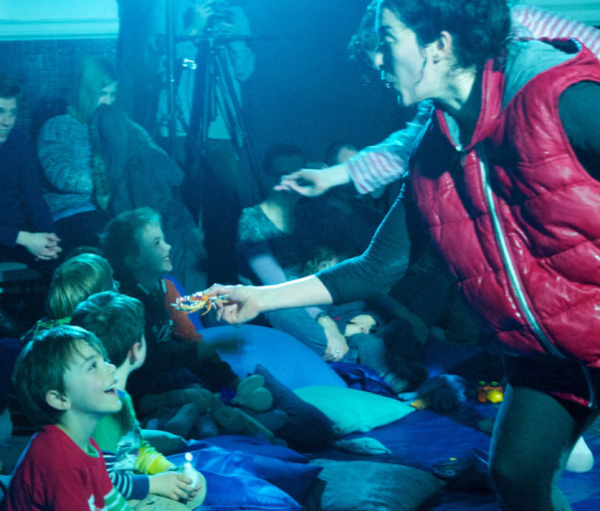Catherine Love: Shining a light on children's theatre

© Edmund Collier
Last Monday afternoon, when I would normally be rooted to my desk, I found myself instead watching what curiously promised to be "a crustacean version of Waiting for Godot" – for kids.
I was at the magical Discover Children’s Storytelling Centre in Stratford (imagine a picture book exploding out of its pages) for an afternoon performance of Inspector Sands’ Rock Pool, a show for three year-olds and up about the unlikely friendship between a crab and a prawn. Punctuating a grey, miserable day, it was a brilliantly cheering interlude.
It made me question why I – and other critics – don’t get to this work more often. Rock Pool was perhaps not the best piece of children’s theatre I’ve seen, but its visual playfulness, simple charm and sheer energy still put it ahead of plenty of its mediocre adult equivalents. (It also has some excellent shellfish-themed puns) Yet this kind of work rarely gets written about. I’m as painfully aware as anyone else of how many shows are competing for the attention of critics, especially in London, but what fails to get reviewed often fails to enter public conversation, leaving it neglected or dismissed.
As the Guardian‘s Lyn Gardner has repeatedly and passionately argued, children’s theatre matters. Particularly at a time when new educational guidelines (cough, Michael Gove) seem to be squeezing out imagination, theatre for young people fills a vital gap. Almost everywhere else, children are taught to value instrumental skills and material possessions; in theatre, as in the arts more widely, they can learn about other kinds of worth. Theatre is a place to dream, to question, to think about the world – for children as much as for anyone else.
And, despite what the lack of coverage might suggest to the contrary, much children’s theatre is just as (if not more) inventive, intelligent and inspiring as that made for adults. I found The Planet and Stuff at Polka Theatre an impressively complex and nuanced a treatment of climate change, even if it did involve flashing lights and paper aeroplanes; Something Very Far Away remains one of the most genuinely moving shows I’ve seen; and The Good Neighbour animated Battersea Arts Centre as beautifully as anything else I’ve watched in the labyrinthine old town hall. I was gutted to miss Ellen McDougall‘s production of Henry the Fifth at the Unicorn Theatre, but by all accounts it was a brilliantly imaginative response to Shakespeare for young audiences.
The Unicorn’s new season, announced today, is a useful and exciting demonstration of the breadth, depth and ambition of children’s theatre. Questions about the universe nestle alongside puppetry for little ones; a new version of The Nutcracker is followed by Brecht’s Caucasian Chalk Circle. And that’s not to mention the mixed bill of international dance and a new piece looking at the formation of Nigeria. The key lies in artistic director Purni Morell‘s desire to allow her young audiences "the space and freedom to explore the world on their own terms", offering a varied programme that strives to do that while never patronising those it speaks to.
I'm aware, however, that this work needs the respect of those who write about it as well as those who make it. If we aren't discussing this theatre and drawing attention to it, what's to keep it from gradually disappearing? Imagination is under enough attack as it is. There are always far too many demands on our time, but I for one will be trying to see and write about more work for young audiences when I can. Why should the kids have all the fun?











